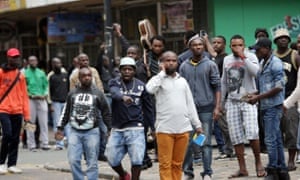
Pí pa Àjòjì ni Gúsù ilẹ̀ Aláwọ̀-dúdú – South Africa’s xenophobic attacks
Òwe Yorùbá kan sọ pé “Amúkun, ẹrù ẹ́ wọ́, ó ni ẹ̃ wò ìsàlẹ̀”. Òwe yi ṣe é lò lati ṣe àyẹ̀wò ìṣẹ̀lẹ̀ pí pa àjòjì ilẹ̀ Aláwọ̀-dúdú yoku, ti ó bẹ́ sílẹ ni Gúsù ilẹ̀ Aláwọ̀-dúdú ni oṣù kẹrin ọdún Ẹgbãlémẹ̃dógún.
Èniyàn dúdú ni Gúsù ilẹ̀ Aláwọ̀-dúdú, jẹ ìyà lábẹ́ Ìjọba amúnisìn fún ọ̀pọ̀lọpọ̀ ọdún. Ìfẹ́ Àlejò/Àjòjì ju ara ẹni, jẹ ki ọ̀pọ̀lọpọ̀ ilẹ̀ Aláwọ̀-dúdú jẹ ìyà lábẹ́ Aláwọ̀-funfun lati Òkè-òkun fún ìgbà pi pẹ́. Ojúkòkòrò Aláwọ̀-funfun si ohun ọrọ̀ ti ó wà ni ilẹ̀ Aláwọ̀-dúdú pọ̀ si, nigbati ọkàn wọn balẹ̀ tán, wọn ṣe Ìjọba ti ó mú onílé sìn. Ìjọba amúnisìn yi fi ipá gba ilẹ̀ Aláwọ̀-dúdú lati pin fún Aláwọ̀-funfun, wọn ṣe òfin lati ya dúdú sọ́tọ̀, pé dúdú kò lè fẹ́ funfun, wọn bẹ̀rẹ̀ si lo èniyàn dúdú bi ẹrú lóri ilẹ̀ wọn àti bẹ́ ẹ̀ bẹ́ ẹ̀ lọ. Àwọn èniyàn dúdú kò dákẹ́, wọn jà lati gba ara wọn sílẹ̀ ninú ìyà àti ìṣẹ́ yi, nitori eyi wọn pa ọ̀pọ̀lọpọ̀ bẹni wọn gbé àwọn Olóri Aláwọ̀dúdú púpọ̀ si ẹ̀wọ̀n ọdún àimoye. Lára wọn ni “Nelson Mandela” ti ó lo ọdún mẹ́tàdínlọ́gbọ̀n ni ẹ̀wọ̀n nitori ijà àti tú àwọn èniyàn rẹ sílẹ̀ lọ́wọ́ Ìjọba amúnisìn.
Ki ṣe ẹ̀yà Zulu tàbi ará ilu Gúsù ilẹ̀ Aláwọ̀-dúdú nikan ló jà lati gba òmìnira lọ́wọ́ Ìjọba Amúnusìn. Gbogbo àgbáyé àti ilẹ̀ Aláwọ̀-dúdú yoku dide pọ lati pa ẹnu pọ̀ bá olè wi. Ni àsikò ijiyà yi, Ìjọba àti ará ilú Nigeria ná owó àti ara lati ri pé èniyàn dúdú ni Gúsù ilẹ̀ Aláwọ̀-dúdú gba òmìnira lóri ilẹ̀ wọn.
Gẹ́gẹ́ bi òwe Yorùbá ti ó sọ wi pé “A kì í fi Oníjà sílẹ̀ ká gbájúmọ́ alápẹpẹ”, àwọn ọ̀dọ́ ti ó npa àjòjì lati ilú dúdú yoku fi Ìjọba ti kò ṣe ẹ̀tọ́ sílẹ gbájúmọ́ àjòjì. A ri pé lẹhin ti dúdú ti gba Ìjọba lati ọdún mọ́kànlélógún sẹhin, ìṣẹ́ àwọn èniyàn dúdú kò din kù tó, pàtàki laarin àwọn ọ̀dọ́. Òṣèlú ilẹ̀ Aláwọ̀-dúdú kò kọ́ ọgbọ́n ninú ọ̀pọ̀lọpọ̀ ọdún ti àwọn Aláwọ̀-funfun fi mu Aláwọ̀-dúdú sìn. Ọ̀pọ̀lọpọ̀ Òṣèlú ilẹ̀ Aláwọ̀-dúdú n ja ilú lólè, wọn nkó ọrọ̀ ilú lọ si Òkè-òkun, wọn hu iwà ti ó burú bi ti àwọn Amúnisìn si àwọn èniyàn wọn. Eleyi ló fa si sá kiri àwọn ọ̀dọ́ lati ilẹ̀ Aláwọ̀-dúdú kan si ekeji tàbi lọ si Òkè-òkun lọ́nà-kọnà.
A lérò wi pé àwọn àjòjì yio hu iwà ti ó tọ́, ki onilé na a mọ̀ pé “Ki á rin ká pọ̀ ló yẹni”, pi pa àjòjì kọ ni yio gbà wọn ninú ìṣẹ́. A si tún lérò wi pé Òṣèlú ilẹ̀ Aláwọ̀dúdú yio ni àyipadà ọkàn lati pèsè iṣẹ́ fún àwọn ọ̀dọ́, pèsè ohun améyédẹrùn igbàlódé àti lati hu iwà rere si ará ilú.
ENGLISH LANGUAGE
One of the Yoruba proverb translated thus, “Lame, your load is crooked, the lame pointed downward”. This proverb can be used to examine the killing of Black African immigrants that erupted in South Africa in April, Twenty fifteen.
For many years, Black South Africans suffered under the Apartheid Regime. Love of Visitors/Immigrants more than one’s people, led to many African Countries’ suffering under the White immigrant from Europe for many years. The White immigrants’ greed over the mineral wealth of Africans increased as they settled in, they then imposed Government that enslaved their hosts. Apartheid Government forcefully acquired African land to share for themselves, enacted law to segregate against the Blacks, law that forbade Black from marrying the White and began to enslave the Blacks within their communities etc. The Africans were not complacent with this situation, they fought to free themselves from suffering and poverty imposed by apartheid. As a result, many were killed and many African leaders were thrown into many years prison. Prominent among those imprisoned was “Nelson Mandela” who spent twenty-seven years in prison for daring to fight to set his people free from the bondage of Apartheid Regime.
It was not only the Zulu ethnic group or the South African people that fought for freedom from Apartheid Government. People all over the World and other African Countries stood together to condemn apartheid. During this period, Nigerian Government and her people, committed resources and emotional support to free South Africans from Apartheid Government on their land.
According to one of the Yoruba Proverbs as translated by (Oyekan Owomoyela), “One does not leave the person one has a quarrel with and face his lackey”, the youths that turned their focus on killing immigrants from other African Countries rather than focussing on the Political Class that are renegading on their political promises. It is observed that since the Black Africans have taken over leadership twenty one years ago, poverty among the Blacks particularly the youths has not been drastically reduced as anticipated. The African Politicians have not learnt lessons from the evil of apartheid imposed by the White. Many African Politicians are looting the Government treasury, siphoning their countries’ wealth abroad and perpetuating the evil act of apartheid on their people. This has contributed to the desperation of Africans to migrate between one African Country to the other and efforts at going abroad at all cost.
It is hoped that immigrants will behave humbly, that the hosts too will realize that “There is beauty in Unity”, killing other African immigrants is not an antidote to poverty. It is also hoped that African Politicians will have a change of heart in order to provide more employment for the youths, more modern infrastructure and respectful behaviour towards their citizens.
Originally posted 2015-04-21 18:18:36. Republished by Blog Post Promoter


